Scottish trawlermen are being urged to target markets in Nigeria and the Far East in an effort to a safeguard the industry from sanctions imposed by Russian president Vladimir Putin.
Elizabeth Truss, the UK’s recently installed Secretary of State for Environment, Food and Rural Affairs, announced possible solutions to Russian’s ban on European food during a fact-finding mission to Peterhead harbour yesterday morning.
She discussed implications of the move with skippers and industry leaders and also spoke to Rural Affairs, Food and Environment Secretary Richard Lochhead about working together with the Scottish Government.
Speaking after her early morning fishmarket visit, Ms Truss said: “The mackerel industry is very important, both to Scotland and to the UK. The Russian ban will particularly effect this industry and what I’m doing is looking at how can we help in terms of expanding existing markets and opening up new ones.
“But also I have been speaking to the members of the industry and fishermen about what other support might be available.”
She said: “There is already a market in Japan and China and it has expanded over the last few years and I think it’s a question of banging our drum more so that more mackerel can be sold into those markets.
“The Nigerian market is something we have been working on for some time and we hope to open that up.
“This is a time for the Scottish Government, the UK Government and the EU to work together. It’s an unjustified ban that Russia has put in place and my role as Defra secretary is to make sure we minimise the impact of that ban on the excellent fishing industry here in Scotland.”
Mr Lochhead, who recently unveiled the Scottish Government’s five-point plan to cope with the sanctions, added: “One of the points of this action plan is to identify new market opportunities overseas. The demand for Scottish seafood is increasing all the time and we have to find a way to make sure mackerel benefits from that.
“I’m urging the UK government to ensure that any help available from Europe is brought to Scotland. That could be in terms of storage or more flexibility about when the quota can be landed.”
The food ban, introduced by Russia in retaliation against countries that imposed sanctions on it over the conflict in Ukraine, represents 0.2% of the UK’s £18.9billion food exports. Products covered by the sanctions include poultry, pork, fish and dairy.
Ross Dougal, vice-president of the Scottish Fishermen’s Federation, joined Ms Truss on her tour of the harbour. He said: “She heard our real fears over the impact of Russian retaliatory sanctions on mackerel fishermen and processors and the importance of support measures to help the sector through this difficult period.
“We welcome that the Secretary of State recognised these concerns and that the UK Government is working with the Scottish Government towards implementing measures to alleviate their impact.”
